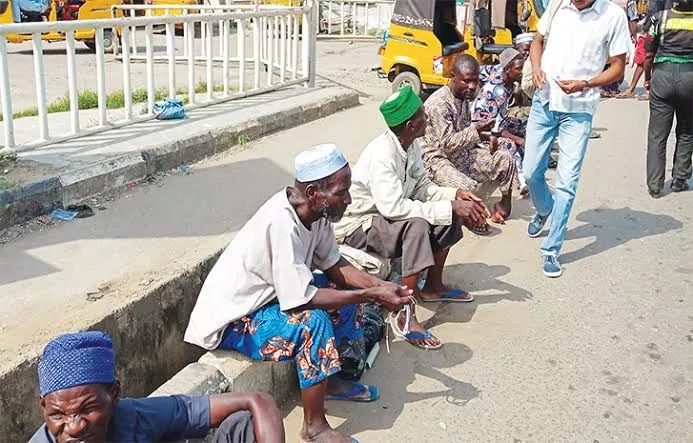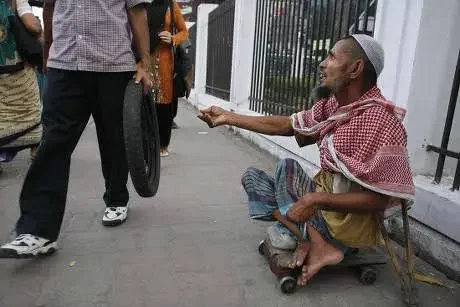
The recent declaration of war on beggars in the Federal Capital Territory, FCT, by the minister, Nyesom Wike, is drawing mixed reactions.
We reported that the minister spoke during the official commencement of the access road construction from Nnamdi Azikiwe Expressway by N16 to Judges Quarters in Katampe District, Abuja, stating that the move was necessary over concerns that Abuja was turning into a beggars' city.
"Let me say clearly now, we have declared war on beggars because Abuja is returning to beggar's city.
"If you know you have a sister, you have a brother who is a beggar on the road; do something, because from next week, we will carry them; we will take them out of the city.
"It is embarrassing that people who come into Abuja, the first thing they see are just beggars on the road.
"Stay in your state and beg. FCT cannot be the centre of beggars. It is the only city we have to showcase to the world. We will not allow it.
"If you want to beg, go to the villages, but leave the city centre. The city must be clean, and we are ready for criminals," he added.

Findings by DAILY POST revealed that this is not the first war against beggars by the Federal Capital Territory Administration, FCTA.
In April 2023, the FCTA sent back 217 street beggars, street boys and vagabonds to their home states.
At the time, the FCTA was reported saying they were to be returned mostly to Katsina, Kaduna, Niger, Jigawa, Kano, Zamfara, Sokoto and Kebbi states.
A year before then, more than 150 beggars, said to be mainly women, children and aged men, were arrested at various locations in the city by the FCTA's enforcement squad.
Reacting to Wike's threat, the FCT chapter of the African Action Congress, AAC, condemned in strong terms the order to arrest helpless Nigerians in the FCT, blaming President Bola Tinubu's government and economic policies that have brought untold hardship to the average Nigerian.
The AAC FCT Chairman, Agena Robert Ande, in a statement, said the order of the FCT administration shows that the government is not in tune with the economic realities facing Nigerians.
"We the African Action Congress (AAC) FCT Chapter strongly condemn the Federal Capital Territory (FCT) Minister's order to arrest helpless Nigerians in the FCT.
"This draconian directive is a clear indication of the government's disconnect from the harsh realities faced by Nigerians. The tag (beggars) placed against these Nigerians is firstly a stigma that is not supposed to be promoted by any reasonable Government," he said.
Similarly, the Socio-Economic Rights Accountability Project, SERAP, threatened a lawsuit against the Minister of the FCT, Nyesom Wike, if he did not withdraw the ultimatum he issued to beggars in the Federal Capital Territory, FCT.
In a post on its official X handle, SERAP stated that no one should be criminalised for their socio-economic status, urging the minister to rather provide opportunities to help the beggars rebuild their lives.
The group said it would not hesitate to file a lawsuit against the minister if he implemented the threat.
"The Minister of the FCT, Nyesom Wike, must immediately withdraw his unlawful threat to arrest beggars in Abuja or face legal action. No one should be criminalised for engaging in life-sustaining economic activities or because of their economic or social status.
"Rather than arresting and cracking down on beggars, Mr Wike should provide them with the opportunity to rebuild their lives and fully integrate into society while respecting their dignity and human rights.
"Mr Wike should immediately begin to address the root causes of poverty and the violations of the economic and social rights of particularly marginalised individuals in Abuja.
"Mr Wike must address the plight of those experiencing homelessness and those living in poverty in Abuja and not demonise and criminalise them," the post read.
We further reports that a Non-Governmental Organization, Long Term Solution for Destitute Initiative urged President Bola Tinubu to warn the Minister of Federal Capital Territory, Neysom Wike over the ultimatum handed over to beggars to vacate the streets of Abuja,
The Chairman of the group, Saleh Ibrahim, in a statement said street begging is an embarrassment to any society that creates the conditions for the rise and growth of such poor and vulnerable people.
"I am particularly embarrassed by the fact that Northerners dominate the population of beggars in the country, despite our privilege of holding political power the longest.
"It's a badge of shame. Islam forbids and discourages begging. Begging destroys one's pride. It is an insult to self-esteem.
"In his last interview with the BBC Hausa Service shortly before his demise, General Hassan Usman Katsina admonished bitterly against begging.
"However, while we are commending the FCT Minister for his "courage" we shouldn't ignore the human rights angle of the issue. We shouldn't treat a complex issue superficially.
"A cosmetic approach to public policy usually makes a bad situation worse. Wike was not the first Minister to expel beggars," he said.
Reacting to the ultimatum by the FCT minister to the beggars, the Arewa Youths for Peaceful Coexistence said the decision was not targeted at northerners.
In a statement, the group appealed to northern religious, political and traditional leaders to stop attacking the minister for taking a bold action to rid the FCT of miscreants.
The group said begging in Abuja, which cuts across all ethnic nationalities in the country, has become a big-time business that must not be encouraged, apart from the fact that it poses security threats to the nation's capital.
The statement read in part,
"The attention of the Arewa Youths for Peaceful Coexistence has been drawn to recent attacks by a cross-section of Muslim Clerics on the Hon. Minister of the Federal Capital Territory (F.C.T.), Abuja, following the disbandment of beggars in Abuja.
"The decision by the Hon. Minister of the F.C.T. to get rid of beggars in Abuja is, therefore, a plausible development that will enhance the security, status and decency standards within and around the Federal Capital Territory and should therefore not be seen as an act intended to hurt or malign any particular group of individuals in the society."
Speaking to DAILY POST, some of the beggars lamented what they called harsh treatment meted on them by the FCT minister, Nyesom Wike.
Abdalla Nuru wondered if the government had made any provision for them before threatening to flush them out of the FCT, adding that their future is no longer guaranteed.
He said they do not derive any pleasure in what they do, but lacked alternatives.
Nuru, who said that they did not envisage being beggars, added that it can happen to anyone who is still alive, decrying how some people treat them.
According to him, they rely on the kindness of strangers for survival, lamenting that with the economic situation, they may face starvation if no alternative comes their way.
He said,
"What have we done? This situation we find ourselves in is not something we want. It can happen to anyone who is still alive. Some people see us coming and run away.
"In public vehicles, nobody wants to sit close to us. You see, some people think that just by interacting with me, they will become blind.
"We depend on what I get from begging. With the current economy, where people are suffering and there's no food, my family and I will have to stay at home and wait for death because there will be nothing to live on. No food.
"I can knit very well, forget that I am blind. The government should empower us instead of arresting and detaining us. We have many of us who are gifted," he said.
Another beggar, who does not want his name mentioned, said he was aware of the directive by the FCT minister, disclosing that he plans to leave the nation's capital for his home state, Kebbi to continue his trade.
According to him, arresting beggars is not the right thing to do, especially in the face of the acute hardship he and his colleagues have been experiencing.
"I came from Kebbi to look for a means of livelihood. I didn't have anything to do, which is why I started begging.
"I heard the news on the radio yesterday. I don't want any problems, so I'm going back to my hometown because if I stay here, there will be nothing for me to do.
"I have three children and a wife. Even if I return, I don't know what I'm going to do.
"Many of us are willing to work but have no opportunity. If they say we shouldn't beg anymore, there should be something else in place for us. I am not happy about begging," he stated.

















Comments